Purchasing a Mandolin
If you have never played a musical instrument at all, or if you are really not certain that this is the instrument for you, you might want to first consider renting a mandolin. There are a number of local music stores that have mandolins available to rent by the month. Renting gives you the chance to try it out the instrument before you invest any money in to something that you may not enjoy playing. If you do like the instrument, many music store owners will credit a portion of the amount that you paid for the rental, toward the cost of purchasing your own instrument.
Mandolins come in three basic styles. The oldest style, which is the most difficultto play, is the "bowlback" or "potato bug" style. They have a rounded back that lookslike a bowl, and are generally not used for anything other than classical music. The "A" style and the "F" style are most commonly used today. The "A" style has a round body with a flat back, and either one soundhole under the strings, or two soundholes on either side of the strings. The "F" style has a carved body with a flat back, and a curlicue on the top. They are both played the same - the only thing that is different is where the strap is attached on each model.
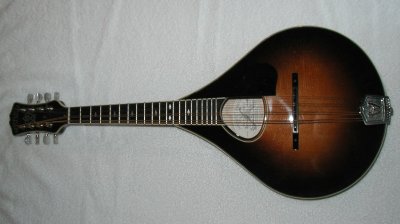
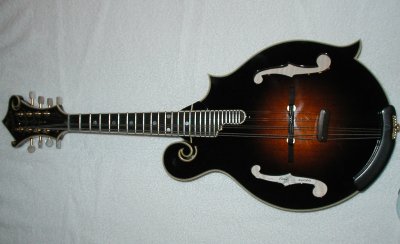
Whether the instrument is new or used, look it over very carefully first.
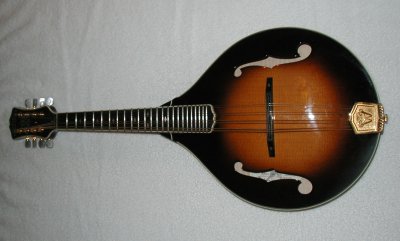
TIt is common and quite acceptable to see signs of wear (scratches, worn varnish) on vintage (100 year old) instruments, but, on a newer instrument, could indicate that it has not been handled carefully. Look at the neck from all views - is it straight? Turn the tuning keys - do they move smoothly? Do the frets (the wires that are embedded in the fingerboard), or the fingerboard itself, show signs of wear? Look at the mandolin from a side view - does it have a slight arch to the top, rather than being perfectly flat?
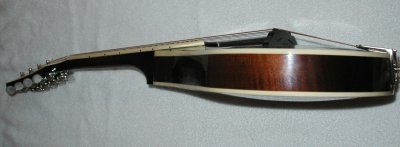
Look at the back of the mandolin - are there any hairline cracks?
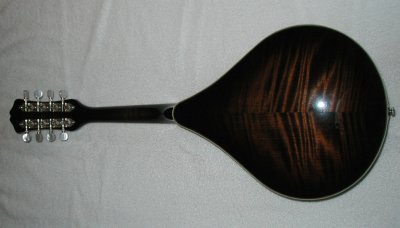
If the answers to any of these questions are "yes", you may want to have an experienced player look at the mandolin before you purchase it. The instrument may require some repairs by a qualified luthier before if can be played without risk of damage. Such repairs can be well worth the money, because they can increase the value of an instrument to far more than what you paid for it.
Mandolins can be purchased easily and inexpensively on Internet auction sites. While I know people who have been quite happy with the instruments they've acquired from the Internet, it's just not an option that would work for me. Depending on the maker of the instrument, the wood used in construction, and the strings used on it, mandolins can sound very different. I'm obsessively particular about how my instrumentsounds, and tried out about 100 different mandolins before I found the one that I like. When you purchase an instrument over the Internet, you don't have the opportunity to first hear how it sounds. If you're not that particular, and you just want to try one out without having to invest a lot of money in it, then that can be a great way to buy a brand new mandolin, at a relatively low cost.
You can also find mandolins in many guitar stores. This is not a bad option for someone who has never played a musical instrument, or for an experienced musician who is looking for an entry level instrument to try. Places that advertise themselves as being "guitar stores" may have one or two mandolins in stock because they are a sideline to their main business. If they do carry mandolins, most do not carry "specific" mandolin accessories - such as mandolin straps and mandolin picks, which are quite different than guitar straps and picks. It can also be difficult to get specific answers to questions you may have, because the employees are usually guitar players, not mandolin players. But the instruments that you will find there are generally affordable, and you do get to hear what the instrument sounds like, before you buy it.
Another option is to look for a store that specializes in acoustic instruments of all kinds, including mandolins, mandolas, mandocellos, banjos and guitars. Such stores are operated by more serious musicians who make it a point to carry instruments that they would enjoy playing themselves. They carry cases, accessories and strings which are made specifically for mandolins. Not only can they answer your questions about the instruments but, because they can play them, they can demonstrate what they're talking about. You can hear how beautiful the instrument sounds when played by an accomplished player even if you're not to that level yourself. Because these stores cater to serious musicians, the instruments that they sell are usually mid- to professional level and therefore more expensive. Every once in a while, though, they do have less expensive used models that they've take in on trade from a player who wanted to move up to a better model.
No matter which instrument you choose, the important thing is that you love the way it sounds. If you love it, you'll want to play it all the time. If you don't, you'll never want to pick it up.